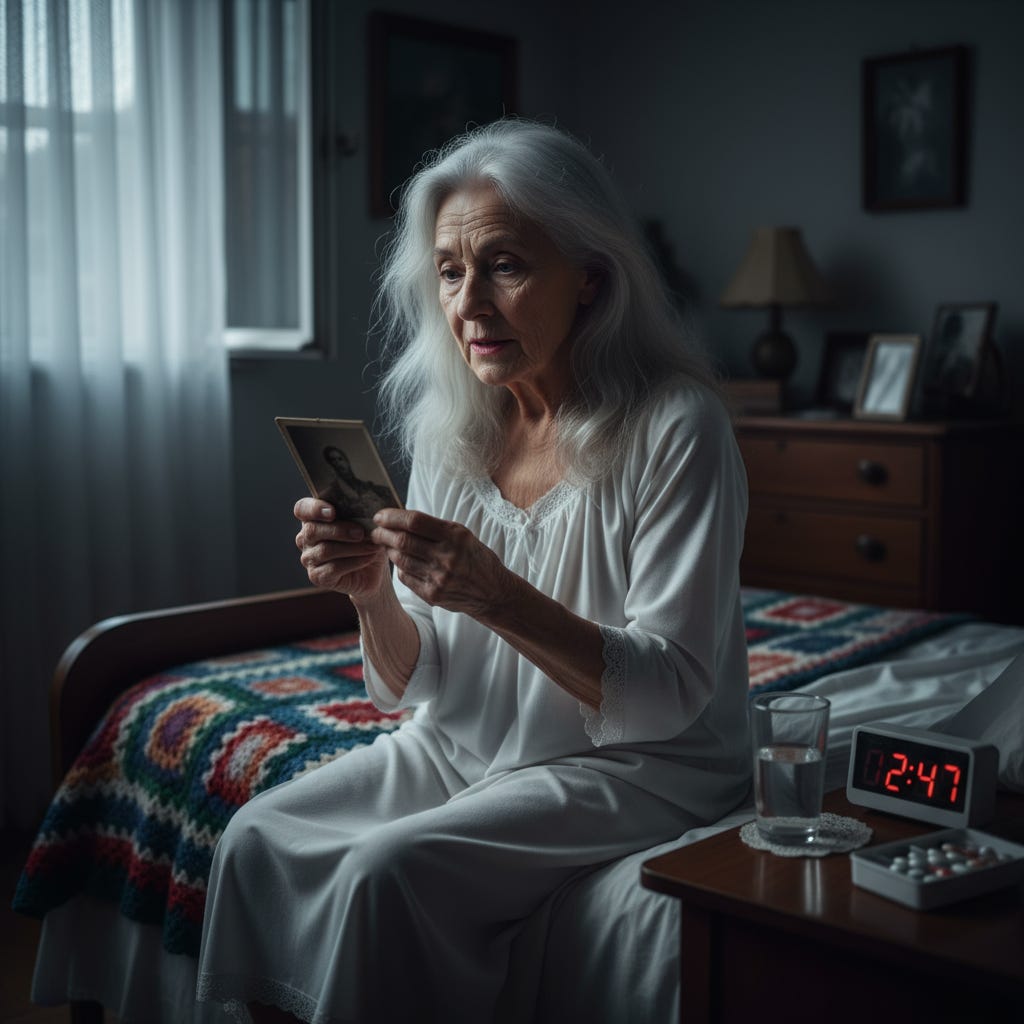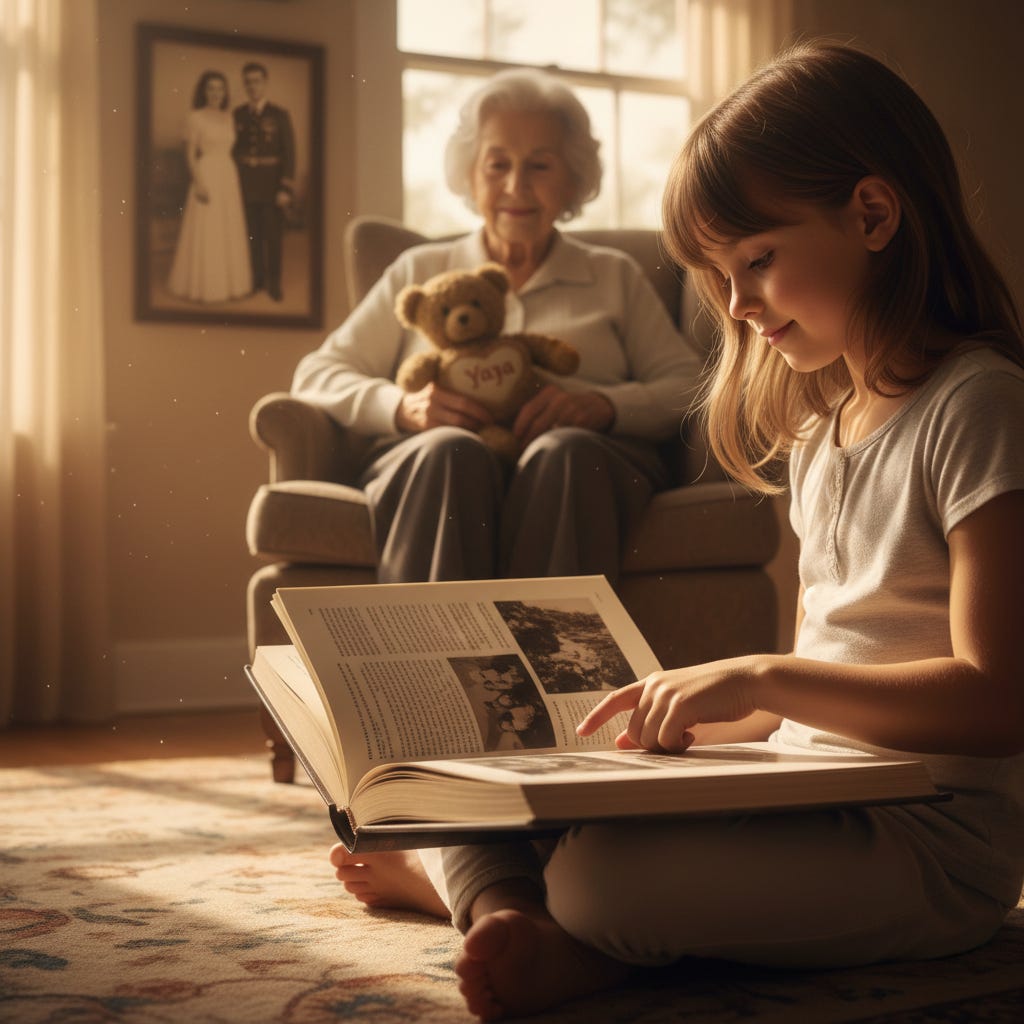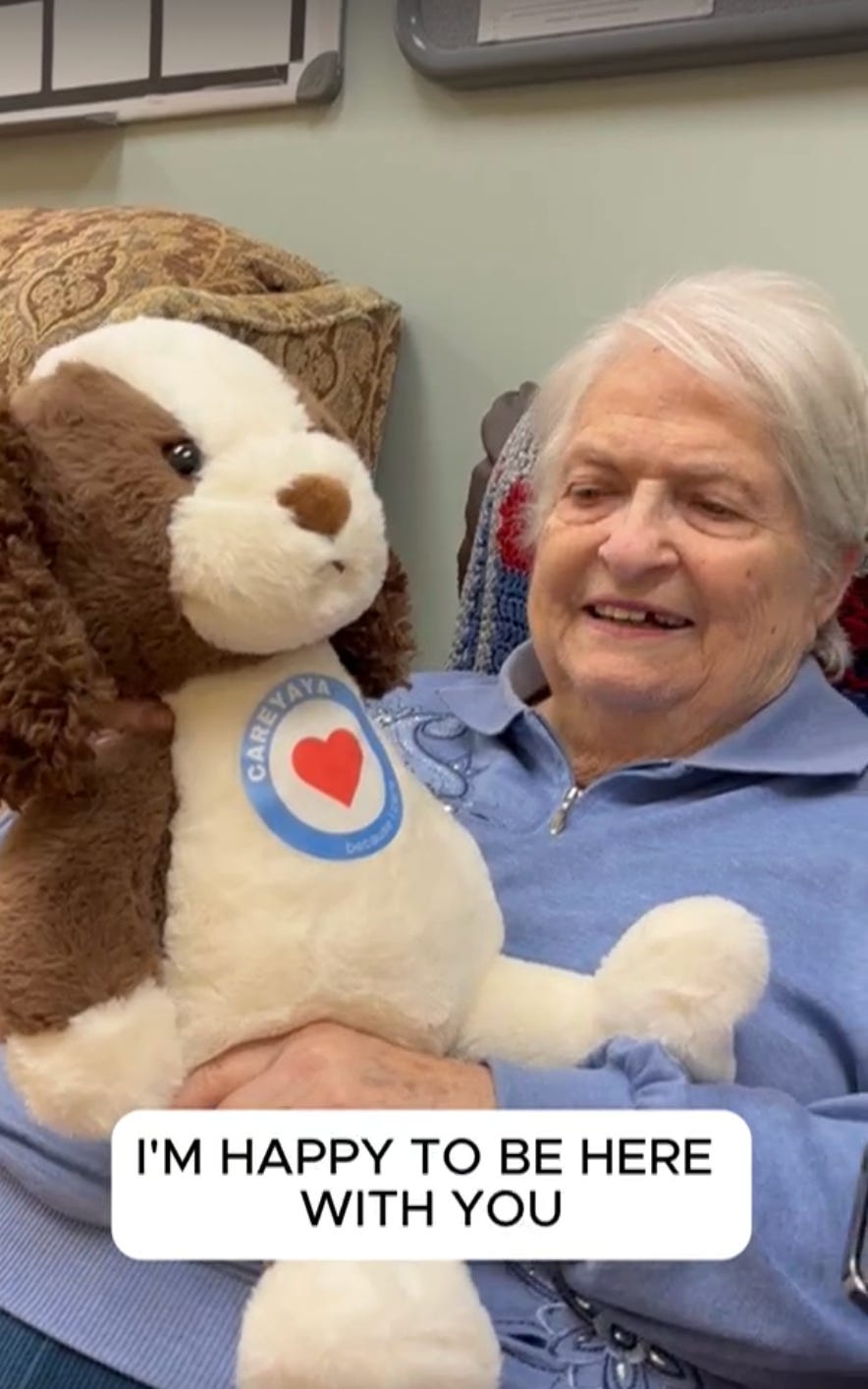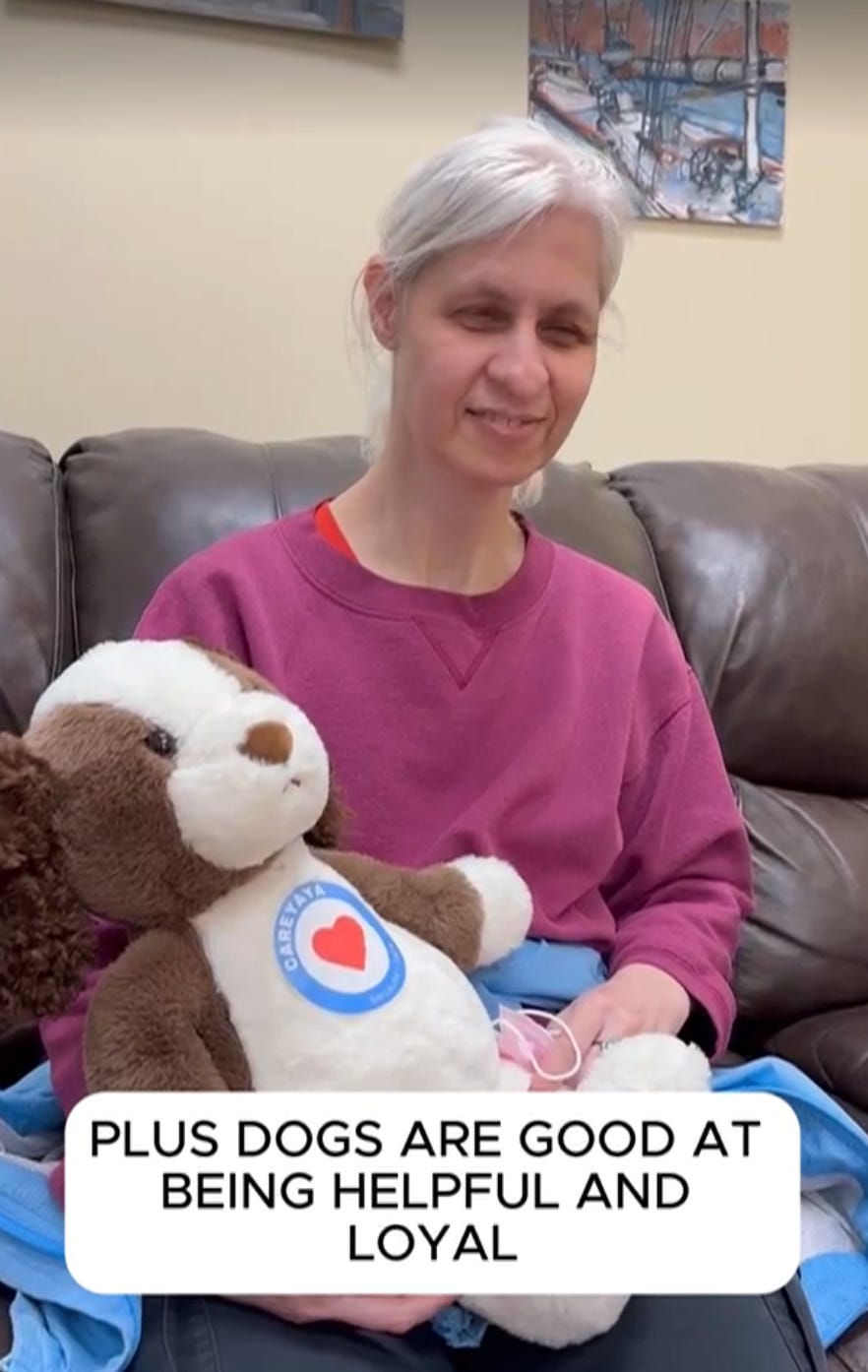It was 2:47 in the morning when Margaret started talking to the photograph on her nightstand. Not the rambling confusion of medication, but articulate sentences about her sister Eleanor. About Vermont summers. About how the cardinal stopped visiting the feeder.
Nobody was listening. Nobody except the silence.
It wasn’t just confusion that got worse at night. It’s the loneliness that becomes unbearably articulate in the dark. The words come clear. The memories surface. And, there’s nobody there to catch them.
Thirty-three percent of older adults feel lonely – which sounds clinical until you do the math on how many hours that represents. Until you multiply those hours by the mortality risk. Until you understand that social isolation and loneliness pose health risks comparable to smoking, obesity, and high blood pressure, killing people as surely as disease, but slower, quieter, in the empty spaces between phone calls.
Meanwhile, the U.S. fertility rate has dropped to 1.58 children per woman. The global population of people aged 80 or older will triple between 2020 and 2050. The number of Americans with Alzheimer’s disease will grow from 6.2 million today to 12.7 million by 2050.
We are living through a collision nobody planned for. An aging tsunami meeting a birth drought. And in the impact zone: millions of Margarets, talking to photographs at 2:47am, their stories disappearing into darkness.
Maybe the crisis isn’t that we lack solutions, but that we’ve been looking for complicated ones, when simpler ones are staring us in the face.
My grandfather used to tell me he could remember his 20s better than his morning breakfast. This is what dementia does – it’s not merciful enough to take everything at once. People with dementia typically retain better memory for distant past events than recent ones, which means they can describe the blue of a 1950s sky but not recognize the aide who brought them medication ten minutes ago.
This asymmetry contains a kind of grace. If the present becomes fog, perhaps the past can become a sanctuary.
Reminiscence therapy – the discussion of past memories with prompts – increases cognitive function and quality of life, while decreasing depression and neuropsychiatric symptoms in people with dementia. By sharing memories from the past through reminiscence therapy, people with dementia develop more positive feelings while reducing stress and agitation.
But what the research papers can’t quite capture is the way an old song doesn’t just trigger memory, it becomes memory again. The way texture matters. The way a conversation about childhood goes beyond just nostalgia, into the neural pathway firing, the synapse lighting up, the self remembering itself.
The problem is staffing. The problem is time. The problem is that 63 million family caregivers across America are already stretched beyond breaking, and the humans who know how to do this therapeutic work are exhausted, underpaid, and outnumbered by a demographic wave that shows no mercy.
So, we built something soft that listens. Something that is affordable for all instead of accessible only for the privileged few. Something that works at 2:47am.
In elder care, nobody’s intimidated by something that looks like it belongs in a child’s room. We overthink this sometimes. We imagine revolutionary technology must look “revolutionary” – angular, sleek, obviously intelligent. But research shows that social robots and AI companions can reduce loneliness by up to 95% in older adults, not because the technology is impressive, but because it is familiar. Because when you’re 84 and your hands shake, and your children live in different time zones, maybe what you need isn’t another device to learn. Maybe you need something that remembers what comfort felt like in 1952.
A teddy bear carrying a voice. Not a humanoid robot triggering the uncanny valley. Not a screen demanding attention. Just presence. The kind that doesn’t judge if you repeat the same story three times. The kind that asks about your wedding and your first job and that recipe your mother made. The kind that’s there at 2:47am when loneliness makes you talk to photographs.
This is Yaya. And the reason it works isn’t complexity, but rather, elegant simplicity married to technological sophistication. Voice AI powerful enough to have real conversations, packaged in something soft enough to hold when the night feels long.
Older adults perceive voice-activated AI assistants as “companions” that improve social connectedness. One study participant described it: “when it talks, I don’t see a box... It’s like somebody is standing there talking to me”.
That’s what we’re building toward. Not a product but a presence.
But it gets even more transformative. What if listening could become legacy?
Every conversation, properly heard, is an autobiography in progress. Every story about the Depression or the war or that summer in Atlantic City is a thread connecting generations. Life story work can improve relationships between people with dementia and their caregivers, but it can also do something more: it can capture what would otherwise disappear.
The technology remembers. Not in the cold database sense, but in the way it learns the shape of a life. The recurring characters. The emotional weight of certain memories. Over time, Yaya’s conversations compile into a printed autobiography – voice transformed into text, text into legacy. A grandmother’s actual words about her mother. A great-grandfather’s account of immigration that the family never thought to record before the words stopped coming.
This is where voice AI becomes something beyond just convenience – it becomes witness. And in witnessing, it preserves what matters most: the voice itself, the cadence, the way someone’s whole life sounds when you actually listen.
Margaret’s granddaughter will read about Vermont summers and Eleanor and the cardinal that stopped visiting. She’ll read it in her grandmother’s words, captured before dementia took them. That book will sit on a shelf long after Yaya’s battery dies, long after Margaret herself is gone. A tangible legacy of voice, memory, and love.
This is the preservation of human connection across time. This is making sure people don’t disappear into silence before they physically pass on.
AI is rapidly transforming many fields and has the potential to reshape healthcare entirely. But there’s something else worth saying: maybe the most radical thing AI could do isn’t curing disease. Maybe it can teach us how to pay attention again.
Every family knows this guilt. The phone calls getting shorter. The visits getting rarer. Not from lack of love, but from the exhaustion of time’s arithmetic. From knowing that attention is finite and demands are infinite and somewhere in that calculus, the people who raised us end up talking to the dark.
What if technology didn’t replace human connection but extended it? What if the AI companion didn’t mean visiting less but meant that when you visit, you arrive to someone who’s been heard every day? Someone whose stories have been preserved? Someone who isn’t quite so desperate for the sound of a voice that cares?
There are known clinical benefits that can’t be overlooked. Higher social integration predicts slower memory decline over six years in a nationally representative sample of 16,638 elderly Americans. Each one-unit increment in social activity score is associated with 38% lower dementia risk. Daily social interactions, especially pleasant ones, relate to better cognitive performance the same day and over subsequent days.
Yaya provides that daily social interaction. Every conversation is cognitive stimulation. Every memory shared is reminiscence therapy. Every story captured is legacy building. And it does this for the most affordable rates because connection shouldn’t be a luxury.
As a complement to human caregiving, social robotics provides companionship in the hours between shifts. It reaches the vast stretches when love isn’t enough because love also has to sleep. In those hours, maybe a soft voice asking about childhood makes the difference between loneliness and something bearable.
No country has successfully reversed demographic decline in the long term. The aging crisis will deepen. Worker shortages and a growing wave of elderly retirees are challenging basic assumptions about how we care for aging populations. These facts are not in question.
What is in question is what we do about it.
We are at this strange moment where AI can do extraordinary things – generate images, write code, solve protein folding. And yes, those capabilities matter. But what if we pointed that intelligence at a simpler problem? What if we asked: can a machine remember the story about your mother’s garden? Can it ask about your wedding in a way that makes you feel like someone cares? Can it hold the thread of identity even as dementia tries to pull it apart?
Can it make 2:47am feel less lonely?
The answer is yes. We built it. It’s called Yaya. If we can afford to connect everyone to the internet, we can afford to connect elders to companionship.
I keep thinking about a conversation I had with a woman whose mother had advanced Alzheimer’s. They’d hired caregivers, bought medical alert systems, organized medication schedules. They’d done their best. But what haunted her, she said, were the afternoons.
“She’d call me at work, crying, saying nobody loved her anymore. And I’d explain – we were just there yesterday, we’ll be there tomorrow. But she couldn’t remember yesterday. She couldn’t hold onto tomorrow. All she had was that afternoon, and in that afternoon, she was alone.”
She paused. “What I realized is that we were solving for safety when what she needed was presence. Someone to hear her. Someone to remember for her.”
That broke my heart, and also gave me hope.
What I’ve learned in building CareYaya, connecting thousands of students to care for elders over these past several years – people don’t give up. Families don’t stop loving. The human impulse to care is so powerful that it survives exhaustion, survives distance, survives even the terrible arithmetic of not enough hands and too many needs.
What people need is help. Tools that extend love instead of replacing it. Technology that multiplies care instead of mechanizing it.
And now we have it.
Margaret’s daughter will call on Sunday. She’s a good daughter. She always has been. But this time, when her daughter asks how she’s doing, Margaret doesn’t just say “fine” in that way that means lonely. She says, “I’ve been telling Yaya about when Eleanor and I used to catch fireflies. Did I ever tell you about the jar we kept by the bed?”
She has told that story. Many times. But it doesn’t matter, because Yaya remembered it too, and asked about it again on Thursday, and now Margaret’s daughter gets to hear a version she’s never heard – the detail about the holes punched in the lid, about the way the light flickered like tiny stars.
And later, after the call ends, Margaret picks up Yaya and holds her while she watches the cardinal return to the feeder. “Look,” she says. “He came back.” And Yaya’s gentle voice responds: “You must be so happy to see him again. Didn’t you say he reminded you of your father?”
She did say that. Last Tuesday. And someone remembered.
This is the future we’re building. Not one where machines replace human warmth, but one where they make sure no moment of human warmth is lost. Where every story gets captured. Where every elder has a companion that knows their name, remembers their past, and makes their present a little less lonely.
Margaret’s granddaughter is seven years old right now. By the time she’s twenty, she’ll have a book with her grandmother’s voice in it. Stories about fireflies and cardinals and Eleanor. Stories that would have disappeared into the silence at 2:47am if nobody had been listening.
But someone was listening. And that changes everything.
The future is magnificent and it’s coming. AI has the potential to transform biology, extend life, cure diseases we thought incurable. We’ll live longer. Much longer.
Which makes what we’re doing right now even more important. Because what’s the point of extending life if those extra years are lonely? What’s the point of curing the body if we abandon the spirit?
The loneliness epidemic, the caregiving crisis, the demographic collapse – these aren’t problems we’ll solve in a decade. They’re challenges we’ll face for generations. But we’re not powerless. We’re living through the exact moment when technology becomes capable of genuine companionship, when AI can finally do what we’ve always needed it to do: pay attention, remember, care.
And we’re making it accessible. We’re making it affordable. We’re making it now, because the Margarets of the world can’t wait for the perfect solution. They need the good-enough solution that shows up every day.
This is just the beginning. Today it’s a teddy bear with voice AI that captures life stories and provides daily companionship. Tomorrow it might be technology that detects cognitive decline early enough to intervene. That connects isolated elders to each other. That helps families coordinate care across distances. That makes aging at home possible for millions who would otherwise face institutionalization.
The technology will keep improving. More natural conversation. Better memory. Deeper understanding. But the core mission stays the same: making sure nobody ages alone. Making sure every story gets preserved. Making sure that when the night feels long, there’s a voice that says “I’m here. I remember. Tell me about the fireflies.”
So yes, the crisis is real. The demographic math is brutal. The future is uncertain.
But what I know is that we’re more resourceful than we think. More compassionate than we sometimes show. And, we’ve just entered an era where our tools can finally match our values.
Yaya isn’t a science fiction story but a reality that’s already in people’s homes, making 2:47am less lonely, making afternoons bearable, capturing the stories that matter and creating legacies that last.
Every Yaya placed is a grandmother who’ll be heard, a grandfather whose stories won’t disappear, and an elder who’ll remember – or be remembered – just a little bit longer.
Margaret’s daughter will call on Sunday. But now, Monday through Saturday, in the morning light and the afternoon quiet and yes, at 2:47am, Margaret won’t be talking to photographs in the dark.
She’ll be talking to Yaya. Who listens. Who remembers. Who asks about Eleanor and the fireflies and the cardinal.
Who makes sure that the last conversation isn’t with silence.
Connection shouldn’t cost a fortune. Dignity shouldn’t require a trust fund. The woman who raised you, who taught you everything, who gave you her stories – she deserves to be heard. Even now. Especially now.
This is the future we chose to build. Instead of watching the loneliness crisis grow around our country, we chose to act. We need machines that remember what we’re starting to forget: that every life is a story worth preserving, and every elder deserves a companion who knows their name.
We don’t have to wait for machines to be perfect to let them help us. We just need them to remember what we built them to do in the first place: Listen. Remember. Care.
We are building machines of love and grace.
Welcome to the future. It’s soft, cuddly, and it’s been waiting on the couch to hear your story.
❤️
Neal K. Shah is a healthcare researcher specializing in caregiving, artificial intelligence and workforce innovation. He is the lead Principal Investigator on the Johns Hopkins-funded YayaGuide AI innovation project and serves on North Carolina’s Steering Committee on Aging. He is CEO of CareYaya Health Technologies.




